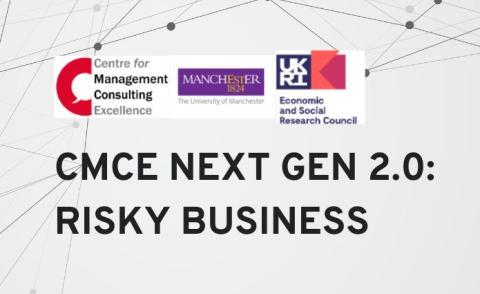Why Do We Fear the Unknown?
On June 13th we hosted the final in our four-part series exploring the basic concepts of behavioural economics and how behaviour, emotions and social relations inform today's business dynamics. This last instalment focused on the role that technology, from AI to robotics to genetics, plays in the way we manage our fear of the unknown and, ultimately, make our decisions. As individuals, groups, and organisations, we engage with new technology differently, depending on whether we see it as a source of endless opportunities that can enhance our personal and professional lives or as a potential threat that could have a negative impact on our future.
By way of introduction, Dr Edmond Smith, Senior Lecturer in Economic Cultures at the University of Manchester and lead speaker and organiser of the series, provided a summary of the series and encouraged participants to ‘connect the dots’ between the multiple topics discussed throughout the different sessions as well as to understand the areas for further exploration. In particular, he reiterated the idea that the highly complex and unpredictable world that surrounds us has been leading us towards a significant change in perspective. This is due to the fact that we have no choice but to constantly step into the unknown and, consequently, accept that we make decisions with a limited – and often biased – set of insights. Considering that, according to the latest estimates, there are approximately 86 billion neurons in the human brain, new research is increasingly focusing on our processing power and how multiple inputs, interlinks and motivations interact when we make a decision.
A relatively new area is that of neuroeconomics which aims at applying neuroscience tools to economic research to create a meaningful connection between neuroscience, psychology, and economics in order to better understand our economic choices. Like individuals, organisations make decisions taking into consideration a wide range of different factors that often go beyond the mere pursuit of profit and look at wider ethical, environmental, and societal matters. Both our personal and organisational decisions are also constricted by biases, mental shortcuts, and an intrinsic fear of the unknown.
This latter point was the focus of the session’s main speaker, Dr Christopher Golding, a Lecturer in Innovation and Strategy at Alliance Manchester Business School, University of Manchester, and an Associate Fellow of the Ministry of Defence’s Development, Concepts and Doctrine Centre (DCDC). He discussed his research examining the potential role of fear as either an enabling factor or a constrainer in the adoption of novel technologies in incumbent firms, depending on how fear of failure and fear of missing out manifest across the organisation. The way in which people experience emotions has an effect on a company’s strategic decision making process and the way in which data and insights are presented also influences how our brain might respond to them, a phenomenon known as framing effect.
Fear is one of the main emotional drivers that can affect key strategic decisions, like whether technology is perceived as an opportunity or a threat. In the business world, Nokia and Polaroid are two famous examples of companies that were victims of the fear of change in their business model. Over the last few decades, it has become increasingly important for leaders and organisations to pay attention to and understand emotional dynamics, like the fear of missing out or the fear of failure that can be equally impactful on the process of adoption or acceptance of innovation.
We were also joined by two panellists: Cosette Reczek and Bruce Garvey. Cosette is a Chartered Governance Professional who is also a guest lecturer at Bayes Business School, City University of London. She founded and currently leads Permuto Consulting to advise and support organisations with board effectiveness, governance reviews, conduct risk, and culture. Bruce provides specialist support for organisations faced with high levels of uncertainty and complexity, addressing problems and issues at a strategic level. He has over 45 years’ experience within the major corporate and SME sectors, performing a wide range of roles as a senior business executive. He has also published papers, presented at conferences, and run workshop-based courses on his specialist area. They both shared practical examples from their careers on how emotional drivers like fear affect companies’ approach to strategy and to the unknown. They highlighted the role played by multiple factors on an individual level but also on a social and cultural one, when we consider a group of professionals making decisions together in an organisation. More specifically, when it comes to technology, early adopters are driven not only by profit but also by the objective to build a competitive advantage, become leaders in the field and/or strengthen their brand.
Dr Golding wrapped up the discussion by highlighting a few key takeaways:
- We should focus on identifying emotions correctly and considering them as a source of useful insights, instead of trying to avoid them;
- We should be mindful of the fact that the way in which we weight different factors in our decision making can be objective or subjective and it is almost impossible to make a fully rational decision;
- We should try to ‘objectify’ data and insights as much as possible, in order to successfully leverage emotional drivers.
I would like to take this opportunity to thank Dr Edmond Smith and his colleagues for their invaluable contribution to this series of workshops that explored a wide range of topics and certainly provided the CMCE community with a set of actionable insights. A big thank you also goes to the group of CMCE panellists who joined the discussions and offered their first-hand experience and practice-based reflections on the ideas and concepts discussed.
If you would like to learn more about this topic, you can watch the video of the session. You can also access all the recordings and additional details from the whole series here.
Valentina Lorenzon is a member of the CMCE Coordination group and editor of the CMCE newsletter.
